In this blog post, Saanvi Singla, a student of University Institute of Legal Studies, Panjab University, given a brief insight into the concept of Dishonoring of Cheque. This article highlights the meaning, scope, purpose, applicability of the concept and remedies in case a cheque is dishonoured.
Introduction
The beginning of cheques in the market has given a new direction to the commercial and corporate world. Now people prefer to carry and execute a small paper called Cheque rather than carrying currency. Dealings in cheques are indispensable and important not only in the banking sector but also for the commerce, industry and the economy of the country. But the rise in dealings with cheques has also led to the rise of the practice of giving cheques without any intention of honoring them.
If the amount of cheque is given by the bank to the respective payee, the cheque is considered as honored. If the bank refuses to pay the amount of the cheque, then the cheque is considered as dishonored. Thus, the dishonored cheque means refusal by the bank to pay the amount of the cheque to the payee. This happens when the drawer draws an e-cheque without following the rules and regulations of issuing a cheque or when he/she draws the cheque exceeding the bank balance.
Section 138, the Negotiable Instruments Act 1881 is designed to prevent fraud on the part of the drawer to draw a cheque without sufficient funds in his/her account maintained by him/her in a bank and to induce the payee in due course to act upon it. The main purpose of this piece of legislation is to instill faith in the efficiency of banking operations and soundness in transacting business on the negotiable instruments.
What is a cheque?
A cheque is a negotiable instrument. It is covered under Section 6 of the Negotiable Instruments Act, 1881. It says that a cheque is a bill of exchange which is drawn on a specific banker. It is not expressed to be payable unless it is demanded. It also includes an electronic image of a truncated cheque as well as a cheque in electronic form.
A cheque is covered in two forms under the said article:
The first type is a cheque in an electric form. It is an exact image of a paper cheque, and it is generated, written and signed in a very secure system and minimum protection is provided for the use of digital signature.
The second type is a cheque in truncated form. It means a cheque which is truncated during the course of a clearing cycle, either by the clearing house or by the bank whether paying or receiving payment, immediately on generation of an electronic image for transmission, substituting the further physical movement of the cheque in writing[1].
Cheques are a very important component of our lives as they are used in almost all transactions such as repayment of the loan, payment of bill, fees, salary, etc. A huge number of cheques are processed and cleared by banks all over the world on daily basis. Cheques are issued for securing proof of payment. Nevertheless, cheques are a reliable method of payment for a large number of people. A cheque is a negotiable instrument. Crossed and account payee cheques are not negotiable by anyone than the payee. The cheques need to be deposited into the bank account of the payee. Legally, the author of the cheque is called “drawer,” the person in whose favor, the cheque is drawn is called as “payee” and the bank who is directed to pay the amount is known as “drawee”[2].
When does a cheque gets dishonored?
When a cheque gets dishonored, the drawee immediately issues a “Cheque Return Memo” to the banker of the payee mentioning the reason for non-payment of the particular transaction. The payee’s banker has to give the memo and the dishonored cheque to the payee. The payee can resubmit the cheque within three months of the date mentioned on it if he truly believes that it will be honored this time. However, if the cheque issuer fails to make the payment, then the payee has the right to prosecute the drawer legally.
The payee can legally prosecute the “defaulter” for dishonor of the cheque only if the amount mentioned in the said cheque is discharged towards the payment of a debt or any other kind liability of the defaulter towards the payee. If the cheque was issued in the form of a gift or towards lending a loan or for any unlawful purpose, then the drawer cannot be prosecuted in such a case.
What is the legal action in such a case?
The Negotiable Instruments Act, 1881 is applicable in the cases of dishonor of cheques. According to the Section 138 of the Act which governs dishonor of cheques, it is a criminal offense and is punishable by imprisonment up to 2 years or with a pecuniary penalty or both.
If payee decides to prosecute, the drawer should be given an opportunity of repaying the cheque amount promptly. Such a chance can only be given in the form of a written notice. The payee has to send a notice to the drawer within 30 days from the date of getting “Cheque Return Memo” from the respective bank. The notice has to mention that the cheque amount is to be paid to the payee within 15 days from the date of receiving the notice. If the cheque issuer does not make a new payment within 30 days period of receiving the notice, the payee gets the right to file a criminal complaint against the cheque issuer under Section 138 of the Negotiable Instruments Act, 1881.
However, the complaint has to be registered in a magistrate’s court within the period a month of the completion of the notice period. It is necessary in this type of cases to consult a lawyer who is trained and well versed in this particular area of cases and can properly proceed further in the respective matter.
Ingredients of the offense in this case
- The cheque has to be issued for the discharge of a debt or any other kind of liability in whole or part.
- The cheque had been presented within a period of six months or within the specified period, whichever happens earlier.
- The payee or holder should have issued a notice in writing to the drawer within a period of 30 days of the receipt of information from the bank regarding the return of the respective cheque as due.
- After receiving such a notice from the holder of the prescribed course of time, the drawer has failed to pay the cheque within a period of 15 days of receiving the said notice.
Reasons for Dishonor of Cheque
- If the date is not written or is written incorrectly or the date that was given is of three months previous or if the advance date is written.
- If the payee’s name is not written or not written in a clear manner.
- If the ordered or crossed cheques are transferred without the proper endorsement and delivery.
- If the amount is not properly written in words or figures or they have been written incorrectly or if the amount written in words and figures do not match one another.
- If the changes made on the cheque are not proved by the drawer who has given his signature.
- If the account number is not written or it is not clear or if it is not clearly mentioned.
- If the signature is not done or if the signature done on the cheque does not match with the signature specification card kept by the bank.
- If the amount mentioned on the cheque is more than the amount that the drawer has in his bank account or if as per bank’s rule the minimum balance of the account of the drawer can’t be maintained.
- If the cheque is overwritten.
- If the cheque is not in proper condition or it is found to be wet, torn or spotted.
- If the drawer has given a specific order to the bank to stop any payment by cheque.
- If the bank has got any information about the death, insolvency or lunacy of the drawer of the depositor.
- If the court of law has ordered the bank to stop any payments of a cheque.
- If the bank balance remains less on account of not collecting the cheque deposited.
- If the drawer has closed the respective bank account before presenting the cheque.
Punishment and Penalty
On receiving the complaint of the said crime, along with an affidavit and pertinent paper trail, the court will issue summons and hear the specific matter. If the defaulter is found guilty, he can be punished with the pecuniary penalty which can be twice the amount of the cheque in question or imprisonment for a term which can be drawn-out up to 2 years or both. The bank also gets the right to stop the cheque book facility given to the defaulter and can close the account for repeated offense of bounced cheques.
If the drawer makes the payment of the cheque in question within 15 days from the date of receipt of the notice, then drawer has not committed any offense. Otherwise, the payee can move forward with his complaint in the court of a jurisdictional magistrate within one month from the date completion of 15 days prescribed in the notice.
Conclusion
This article does not claim to be an all-comprehensive one on the subject. But this should provide a basic insight into the main characteristics of Section 6 and 138 of the Negotiable Instruments Act, which makes dishonoring or bouncing of a cheque a criminal offense.
Due to the infusion of the punitive provisions, the issue of dishonoring of the cheque has been reduced to some extent, and the trading community now feels more assured in receiving the payment through cheques. But the only hindrance is that there is no provision for recovery of the amount covered under a dishonored cheque. In a case where an accused is convicted under Section 138 and the accused has served the sentence but is unable to deposit amount of fine or the cheque, the only option that is left with the complainant is to file a civil suit. The provisions of the Act does not provide for any other method for realization of the amount due to the complainant if the cheque has been dishonored for the reasons of “insufficient funds” in the drawer’s account. The proper course that a complainant can adopt in such a situation is to file a suit before a competent civil court, for recovery of the amount due to him for the reason of a dishonored cheque, which the complainant is at liberty to avail if so advised by the law.
Footnotes:
[1]http://www.vakilno1.com/legal-faq/dishonour-of-cheque-section-138-of-the-negotiable-instruments-act.html
[2]http://www.indiainfoline.com/article/research-articles-personal-finance/cheque-dishonoured-a-step-by-step-guide-for-legal-recourse-113111500895_1.html
 Serato DJ Crack 2025Serato DJ PRO Crack
Serato DJ Crack 2025Serato DJ PRO Crack


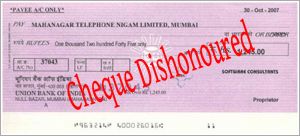
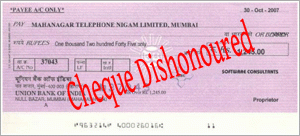

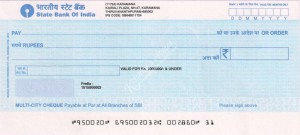
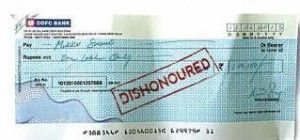

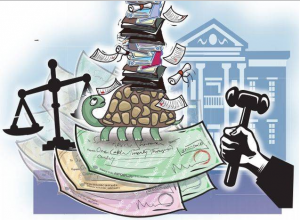




 Allow notifications
Allow notifications


